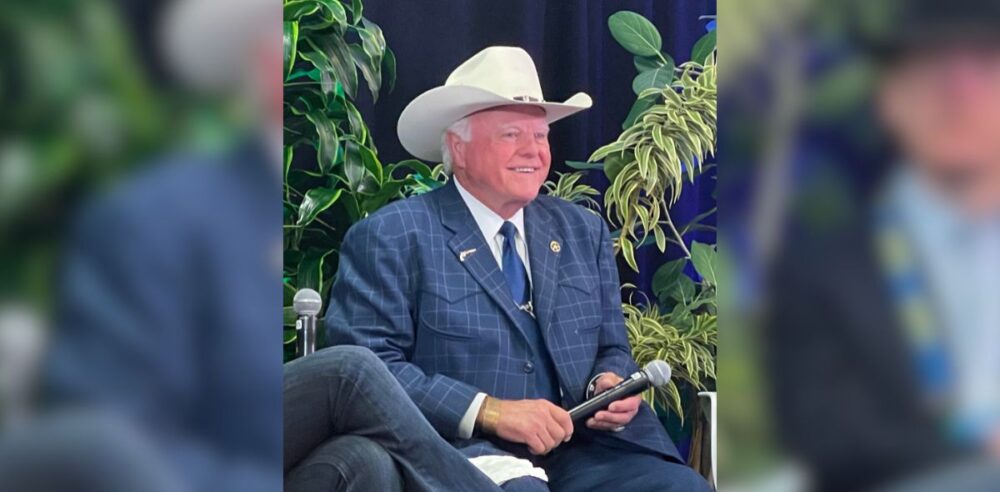Texas’ Agriculture Commissioner said the state is hemorrhaging agricultural jobs because of strains on water infrastructure.
“We lose about a farm a day in this state,” Commissioner Sid Miller said to the attendees of a panel on the future of Texas agriculture at the EarthX environmental conference in Dallas on April 23.
The commissioner added, “1,600 people come to Texas every day but they don’t bring any water with them.” As Texas’ population grows, the commissioner sees Texas’ resources being strained and infrastructure flaws becoming exacerbated, potentially constraining development.
Miller believes Texans are already suffering from a struggling water system. He said water-related agricultural losses have included the closure of Texas’ last sugar mill and the loss of countless acres of citrus in the valleys of South Texas. Regarding the sugar mills, Miller said the strain on water infrastructure comes from the Lone Star State’s relationship with Mexico.
Mexico’s “Water Debt”
Miller used the phrase “water debt” to describe the water dependency issue. According to Miller, Mexico does not meet its obligations under a water treaty with the United States, and therefore, the water exchange relationship between the two nations is imbalanced in favor of Mexico.
The commissioner is not the only Texas official who made this observation. “This crisis was caused by the Mexican government’s failure to meet its obligations under the 1944 water treaty,” U.S. Rep. Monica De La Cruz (R-TX) said at the time of the sugar closing in March, per Border Report. “It has not only jeopardized our agricultural heritage but as we can see it has jeopardized the livelihood of over 500 workers here in the sugar mill and poses a serious threat to our region’s economy and our national food security.”
DX previously reported that the agreement stipulates Mexico must provide 1.75 million acre-feet of water to the Rio Grande within a five-year period, but as of April, based on information from the U.S. International Boundary and Water Commission, only about 480,000 acre-feet had been supplied since October 2020.
Since the flurry of media coverage focused on the mill closure, there have been few reports on the water exchange imbalance. However, Miller announced during his remarks that he was aware Mexico’s President, Claudia Sheinbaum, had recently sent President Donald Trump a letter on the matter, although the commissioner had not yet seen it.
Line Loss
Miller said there are several issues with the water transmission lines within Texas’ borders, including in some rural places, where the water lines are still made of cast iron and burst whenever the ground shifts. The commissioner added that these areas can not afford to update their pipe systems and are forced to patch the aging system repeatedly.
Even where lines are more modern, he said, “Cities lose 30% of the water by the time they get it to the customer.”
Ineffective Capture and Storage
Compounding these issues, Miller explained that Texas’ infrastructure does not do a good job of recapturing rainwater from places like parking lots and warehouses. However, he commended Texas’ oil and gas industry for transitioning to brackish and recycled water for fracking and noted, “They are really leading the way.”
Miller conceded that frackers’ aquatic practices were not perfect because the water the industry uses is still not drinkable.
Following his train of solutions, the commissioner indicated support for some degree of water desalination programs and said that storage of freshwater from the Colorado River, as it flows through Texas, had been effective at providing water to Texas agriculture.
He thought that groundwater storage through building lakes was “not effective in the short term” because permitting and environmental concerns can hamper lake-building programs for decades.
Hays County Commissioner Walt Smith, who appeared with Miller on the panel, shared his belief that aquifer storage is also ineffective because any water manually added to aquifers is gone within a few days. “It is essentially a moving river [in the aquifer],” he added.
However, Smith disagreed with Miller’s assertion that Texas’ future growth could be hamstrung by a lack of water. The Hays County Commissioner said Texas was not out of water, but “it is just on the wrong side of the state.”
Although he disagreed with Miller’s judgment, he concurred with his reasoning. Smith thought improved transmission lines could move surplus water from rivers to wherever it is needed most in the state. He argued that water transmission today should be treated as Texans treated electricity infrastructure development in the 1920s.
During the Q&A, an attendee asked the duo if they thought creating water transmission lines between other states and Texas would be possible. Miller answered succinctly that he did not think it was possible. Smith warned that the project may not be prudent as the same pipes that would theoretically supply water to the state could also take it away.
Miller recently unveiled a $280 million relief package last week to help South Texas farmers battling continued water shortages.


